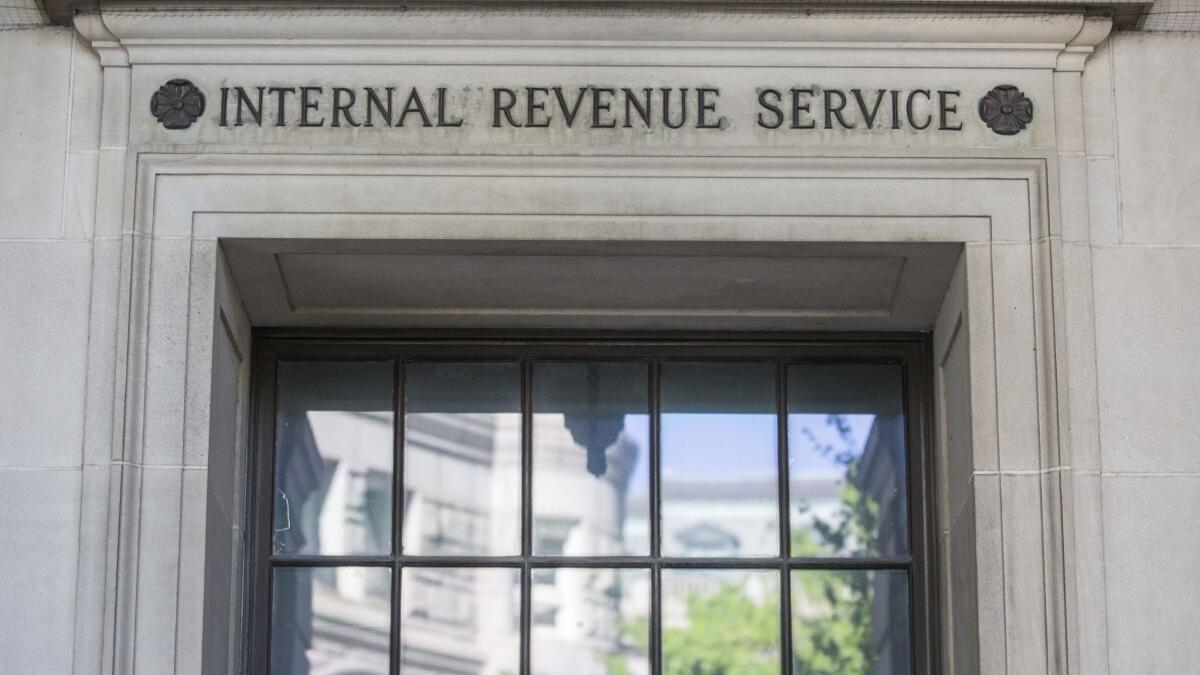On tax day, most Americans don’t feel new law made them better off

Reporting from Washington — Along with their taxes, Americans have also filed a verdict this spring on the Republican tax law: Meh.
When the law passed, late in 2017, President Trump and other party leaders hoped it would significantly boost their fortunes. But as the first filing season under the new law drew to a close, most Americans did not feel it had fattened their paychecks, and only about 1 in 4 supported it, according to a new USC-Dornsife/Los Angeles Times nationwide poll.
One in 3 said they opposed the law and roughly 4 in 10 either had no opinion or were neutral.
Those who said the new law had made them financially better off — either by increasing their take home pay or their refunds — offered more support for the law than those who did not experience a benefit. But for most taxpayers, the new law didn’t have a big enough impact to outweigh partisanship, the poll found. Republicans largely support the new law, while Democrats oppose it; most others don’t have an opinion.
The poll also asked those who expect to vote in a Democratic primary which candidate they preferred. Joe Biden, the former vice president, and Sen. Bernie Sanders of Vermont topped the list with 30% and 19%, respectively, among those who volunteered a name.
The results were very similar when potential voters were shown a list of 16 candidates, although significantly fewer voters could venture an opinion when asked to volunteer a name. Shown the list, about 1 in 4 said it was still too early to have a choice.
Behind the two leaders, Sen. Kamala Harris of California and former Rep. Beto O’Rourke of Texas came next, each with 7% support. Harris did best among voters in the West, largely on the basis of strong support among her fellow Californians, the poll found.
Age ranked as the biggest difference among supporters of the two leaders — Biden got backing from 4 in 10 older than 70, but just over 1 in 10 younger than 30. Sanders led among those under 30, but his support dropped sharply with age. That’s consistent with a raft of other surveys of potential primary voters nationwide and in states that have contests early in the primary season.
The age gap could pose a problem for Sanders since older Americans vote more consistently, especially in primaries, said Robert Shrum, the veteran Democratic campaign consultant and co-director of USC’s Center for the Political Future, which co-sponsored the poll.
The “resistance to him as you go up the age scale” could limit Sanders’ ability to expand his support, Shrum said.
Despite early attention to the race, gender and ideology of the candidates, most candidate traits had limited impact on voter preferences, noted Jill Darling, the survey director. Only 1% of potential Democratic voters, for example, ranked having a female candidate as the top characteristic they were looking for. Most chose descriptions that contrast with Democrats’ image of President Trump, listing such top traits as “honesty,” “good character” “intelligence” and “compassion.”
The poll indicates that Democratic voters so far “have not signed up for a contest centered on identity politics,” noted Mike Murphy, the longtime Republican campaign strategist and co-director of the USC center. That could change as the candidates begin to clash directly, but “so far it’s just absent,” he said.
Similarly, issue differences among the candidates don’t yet seem to have a major impact. Although Sanders has made Medicare for All the centerpiece of his campaign, as in 2016, Biden still led among the roughly 1 in 4 who listed healthcare as their top issue.
On the tax law, the new poll joins a growing body of evidence that the legislation has not given Republicans the political benefit they had hoped for.
Democrats campaigned against the law last year, saying it gave too much of its benefit to corporations and wealthy Americans. Earlier this year, the law took on more criticism amid reports of taxpayers discovering smaller refunds than they had expected.
That problem abated as tax season went along, according to IRS data. Through the first week of April, the most recent data the IRS has published, the average refund and the total number of refunds nationwide were down just over 1% from last year.
Tax experts say that most Americans received at least some benefit from the new law — about two-thirds of individual taxpayers got a cut, according to the nonpartisan Tax Policy Center — but the poll indicates many didn’t feel it.
Just under 4 in 10 of those surveyed said they had noticed a change in their paychecks not caused by a raise or job change, with most of those reporting an increase. Among those who did see a change, about 3 in 4 attributed it to the tax law. Overall, fewer than 1 in 3 said the tax law had boosted their pay.
That’s consistent with previous research indicating that most people don’t notice tax changes that cause small increases in their paychecks, noted Marco Angrisani, an economist at USC’s Center for Economic and Social Research, which administers the poll.
Among those who got refunds last year and had filed this year’s returns, fewer than 1 in 3 said they were either getting a larger refund this time or owed less money. About 1 in 3 said they either were getting about the same refund as last year or owed the same amount. One in 4 said they either were getting a smaller refund or owed more money this year.
None of those outcomes had as much impact on people’s view of the law as their partisanship, however.
“While experience seems to shape people’s support, party affiliation supersedes it,” Angrisani said. That’s especially true for Democrats, the poll found: Even among those who reported being better off this year than last, only 1 in 20 support the new law.
This USC-Dornsife/Los Angeles Times poll was conducted March 15 to April 15 among 5,165 adult Americans, including 2,196 potential Democratic primary voters. Respondents were drawn from a probability-based panel maintained by USC’s Center for Economic and Social Research for its Understanding America Study. Responses were weighted to accurately reflect known demographics of the U.S. population. The margin of error is 2 percentage points in either direction.
A full description of the methodology, poll questions and data, and additional information about the poll are posted on the USC website.
Get the latest news from the nation’s capital on Essential Washington >> »
More to Read
Get the L.A. Times Politics newsletter
Deeply reported insights into legislation, politics and policy from Sacramento, Washington and beyond. In your inbox three times per week.
You may occasionally receive promotional content from the Los Angeles Times.









